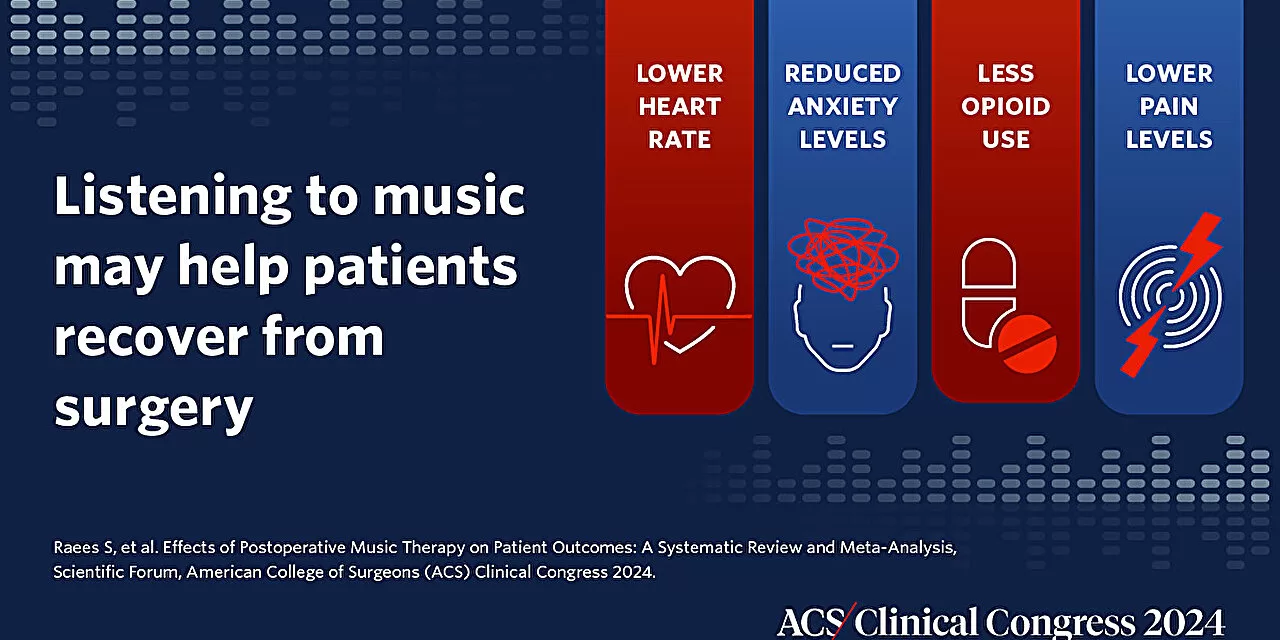San Francisco, California—A simple, cost-effective way to accelerate recovery from surgery could be as close as your favorite playlist. New research, presented at the American College of Surgeons (ACS) Clinical Congress 2024, reveals that listening to music may significantly improve patient outcomes post-surgery. The study was conducted by researchers from the California Northstate University College of Medicine in Elk Grove, California.
The research team sifted through 3,736 studies to focus on 35 papers that analyzed the effects of music on various aspects of recovery, including pain, anxiety, heart rate, and opioid use. The results were impressive: music therapy, whether delivered through headphones or speakers, showed measurable improvements in patients’ recovery experiences.
Key Findings:
- Reduced Pain: Patients who listened to music reported significantly lower pain levels the day after surgery. Using two established pain assessment tools, the Numeric Rating Scale and the Visual Analog Scale, patients experienced a reduction in pain by around 19% and 7%, respectively.
- Lower Anxiety: Anxiety levels also dropped, with patients experiencing a 3% decrease, as measured by the State-Trait Anxiety Inventory, a widely-used tool to assess anxiety levels in patients.
- Less Opioid Use: Music-listening patients used less than half the amount of morphine compared to their counterparts. On average, patients who did not listen to music required 1.654 mg of morphine, while those who did listen needed only 0.758 mg, a dramatic difference that could contribute to reducing the risks associated with opioid use.
- Lower Heart Rate: Patients who listened to music also had a lower heart rate—by about 4.5 beats per minute. This is a significant finding, as maintaining a stable heart rate is vital for ensuring efficient circulation of oxygen and nutrients, crucial for postoperative healing.
“When patients wake up after surgery, sometimes they feel really scared and disoriented,” explained Dr. Eldo Frezza, senior author of the study and a professor of surgery at California Northstate University College of Medicine. “Music can ease the transition from anesthesia to recovery and help reduce stress during that period.”
Why Music Helps
Unlike more active therapies such as meditation or physical exercise, music is a passive form of therapy. “You don’t have to do anything except listen,” said Shehzaib Raees, the study’s first author and a third-year medical student. “When listening to music, you can disassociate and relax, which helps patients calm down in stressful post-surgical situations.”
Researchers believe that music may reduce cortisol levels, a stress hormone linked to slower recovery and higher pain levels. However, several factors, such as the duration of music exposure, were not controlled in the analysis, which will be explored in future research, including a pilot program assessing music in surgical and intensive care settings.
Practical Advice for Patients
Dr. Frezza emphasized that the choice of music is entirely personal. “We’re not saying one type of music is better than another. The key is listening to something you enjoy, something familiar, which can help you feel comforted after surgery.”
This study adds to a growing body of research supporting the benefits of music therapy in healthcare settings. With its low cost, ease of use, and substantial impact on patient outcomes, music could become a standard component of post-surgical care in the future.
Looking Ahead
Future studies will explore the precise mechanisms through which music facilitates recovery, along with specific recommendations for the duration and timing of music therapy. If confirmed, these findings could change how hospitals integrate non-invasive therapies like music into recovery protocols, potentially reducing the reliance on pain medication and improving overall patient well-being.
For now, researchers suggest that post-surgical patients hit play on their favorite songs as part of their recovery journey—because healing might just sound a little sweeter with music.
More information can be found in the study titled Effects of Postoperative Music Therapy on Patient Outcomes: A Systematic Review and Meta-Analysis presented at the ACS 2024 Congress.












